First online English lesson ideas
One of the biggest dilemmas I’ve faced over the past ten years as an online English language teacher is coming up with suitable first online English lesson ideas to make sure that I engage and retain new adult students.
However, through a process of trial and error, I’ve been able to establish a plan for the first online lesson I have with newcomers.
The following ideas I shall share are suitable for most levels of English language proficiency, apart from perhaps beginner level. It's expected that the lesson will last 45 minutes:
1. Gently share and visually demonstrate your language teaching philosophy and beliefs without being pushy and arrogant
If you have the urge to share your language teaching philosophy and beliefs with new students, go ahead and do it. After all, they’d be thrilled to hear that you have a plan to help them conquer the intermediate language learning plateau.
My English language teaching philosophy revolves around the revision of previously encountered language (namely, lexical chunks), the study of collocations, the need to adopt language learning strategies and the necessity of stripping down the grammatical syllabus.
Let me break down the four aforementioned elements of my teaching philosophy:
(a) Lesson notes - Revision of previously encountered language
I’ve written an extensive post about how to structure an online language learning lesson. This article is also full of invaluable information if you’re seeking to put together first online English lesson ideas.
In the write-up, I emphasise the need to revise words, phrases and short sentences which incidentally arose or appeared in materials from previous lessons. It’s also a smart move to note down any pronunciation errors your students make (see below after ‘Pron’). Finally, I give students the chance to correct any errors they made in the previous session if we hadn’t already done so at the end of that session.
In my view, it’s productive to do this revision at the beginning of every online class as a warm-up exercise:
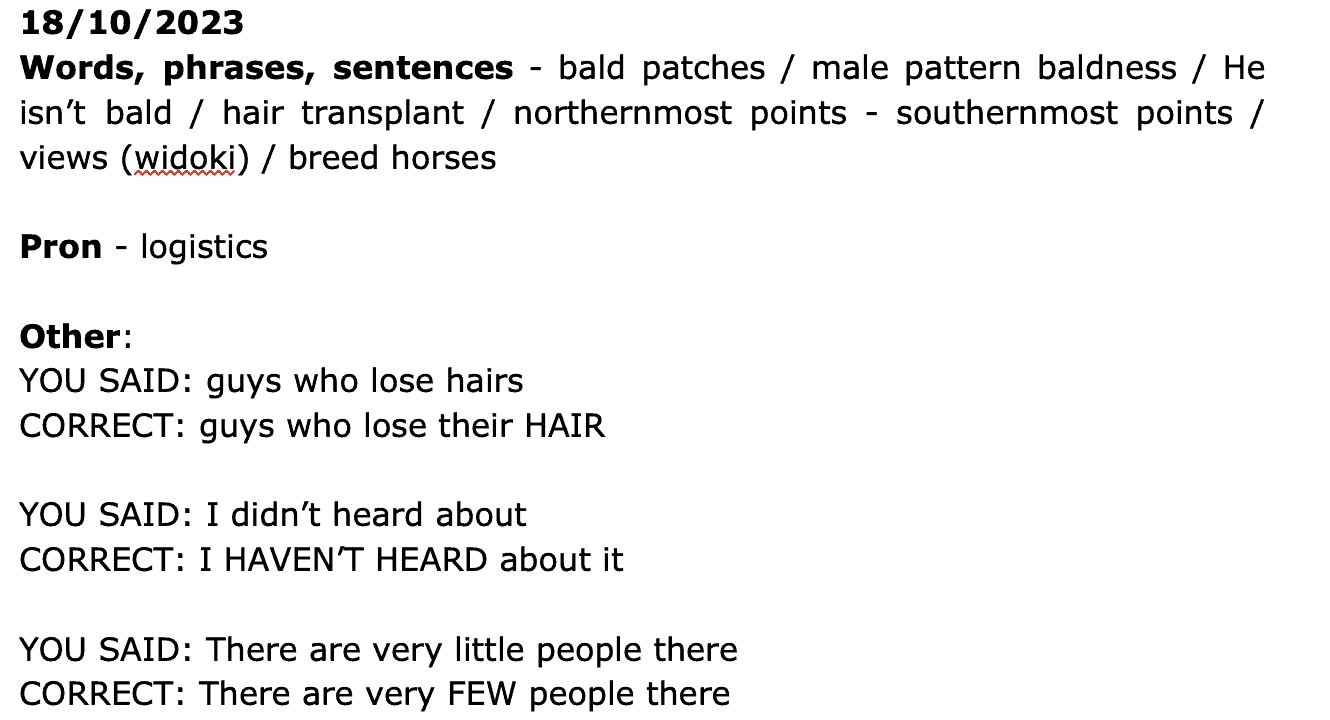
I don’t just focus on notes from the previous lesson. Revision should be all-encompassing. Therefore, I test students on notes from previous weeks, months and even years.
(b) The Study of Collocations
There are some very compelling reasons as to why English language learners should learn collocations.
One major reason is that spoken English generally comprises multi-word expressions (collocations) with the delexical verbs make, give, do, take, have and get. Just off the top of my head: do the housework, take a break, have a nervous breakdown, and get run over.
Another reason why it’s worth getting learners to study collocations is because greater collocational knowledge may contribute to the necessary shift from making overly formal utterances to more natural and informal utterances. For example, why say “Please call me when you arrive home” when you can apply two common collocations with give and get?: “Give me a ring when you get home”.
All in all, I drive the point home to students that they should focus less on single unit vocabulary and more on multi-word lexical units, i.e. collocations.
(c) Adopt a language learning strategy
It’s worth spending another five minutes demonstrating a language learning strategy to students which they can use to aid their journey to becoming an independent language learner.
I’ve written extensively on this blog about the Word-Phrase Table. Essentially, I encourage my students to take a number of the collocations, other lexical items, such as phrasal verbs, or even grammar structures they meet in an article or transcript, and create personalised sentences which contain them.
What is a personalised sentence? In this context, personalised sentences are true sentences about you, your life circumstances, your family and people you know. The reason I advise learners to create personalised sentences which contain a target word, phrases and structure etc. is because these sentences come packed with benefits. Namely, with regular revision or an effective spaced repetition system, learners may find that these sentences are on the tips of their tongues (or “swimming” in their brains) when they’re in full conversational flow.

Two entries in a Word-Phrase Table for the words 'overseas' and 'abroad'
(d) Strip down the grammatical syllabus
Although we’re still in demonstration and explanation mode, rather than teaching mode, I always seek to begin the process of undoing the ghastly grammar-heavy instruction that students were most likely subjected to at school.
When a teacher follows a grammatical syllabus, learners study grammatical structures in a set order according to their perceived complexity rather than their actual use in communication.
Why must your first lessons with a student revolve around the present simple, followed by the present continuous, then the past simple, and so on?
If language learning occurred in a perfect linear fashion, my Polish students would not commit that very common sin of using the present continuous when the present simple is required.
Frankly, students don’t need to be exposed to so many tenses and aspects. I honestly can’t remember the last time I used the future perfect, future perfect continuous or the past perfect continuous.
Overall, it’s a message worth driving home to students in the very first class. The learning of grammar should be incidental and very selective. When I choose to teach students how to use the present perfect to introduce life experiences, closely followed by the past simple for details pertaining to these experiences, I do it safe in the knowledge that it’s common for people to talk about life experiences in the real world.
A vital 20 minutes in your new student’s journey to mastering English
In summary, your first online English lesson ideas don’t have to revolve around instruction, instruction and more instruction. Take the time to share your beliefs and English language teaching philosophy. This 20-minute lecture could have such a positive impact on your student’s motivation levels whilst also giving them a fresh perspective on the English language.
2. Pick a topic which treads a very fine line between making meaningless small talk and leaving students with very little to say
Even though the article is a bit out of date (May 2014), I’ve tended to choose the topic of work-life balance for my first lesson with new students.
So, before our first meeting, I would send this BBC article to students titled: No such thing as work-life balance. I inform them that we’ll have a discussion on the topic, although they’ll talk for 95% of the time. The topic of work-life balance is conducive to getting students to open up or come out of their shell. I’m also aware of the fact that I do speak at some length during the first part of the class.
Anyway, here’s how I would go about exploiting this BBC article so that students receive an optimal speaking and linguistic workout:
Stage 1 - Conversation
Ask some general questions pertaining to whether students have been able to achieve and maintain a healthy work-life balance over the years. In my view, all good first online English lesson ideas should strike a balance between generalising, so that students can speak from personal experience, and making reference to material in order to keep students on their toes and enable them to reflect on what they’ve read or listened to. Therefore, you can refer to the following points from the article if the conversation begins to dry up:

Stage 2 - Go over key words/phrases
After dealing with the conversation, you may go over the most useful words and phrases which appear in the article:
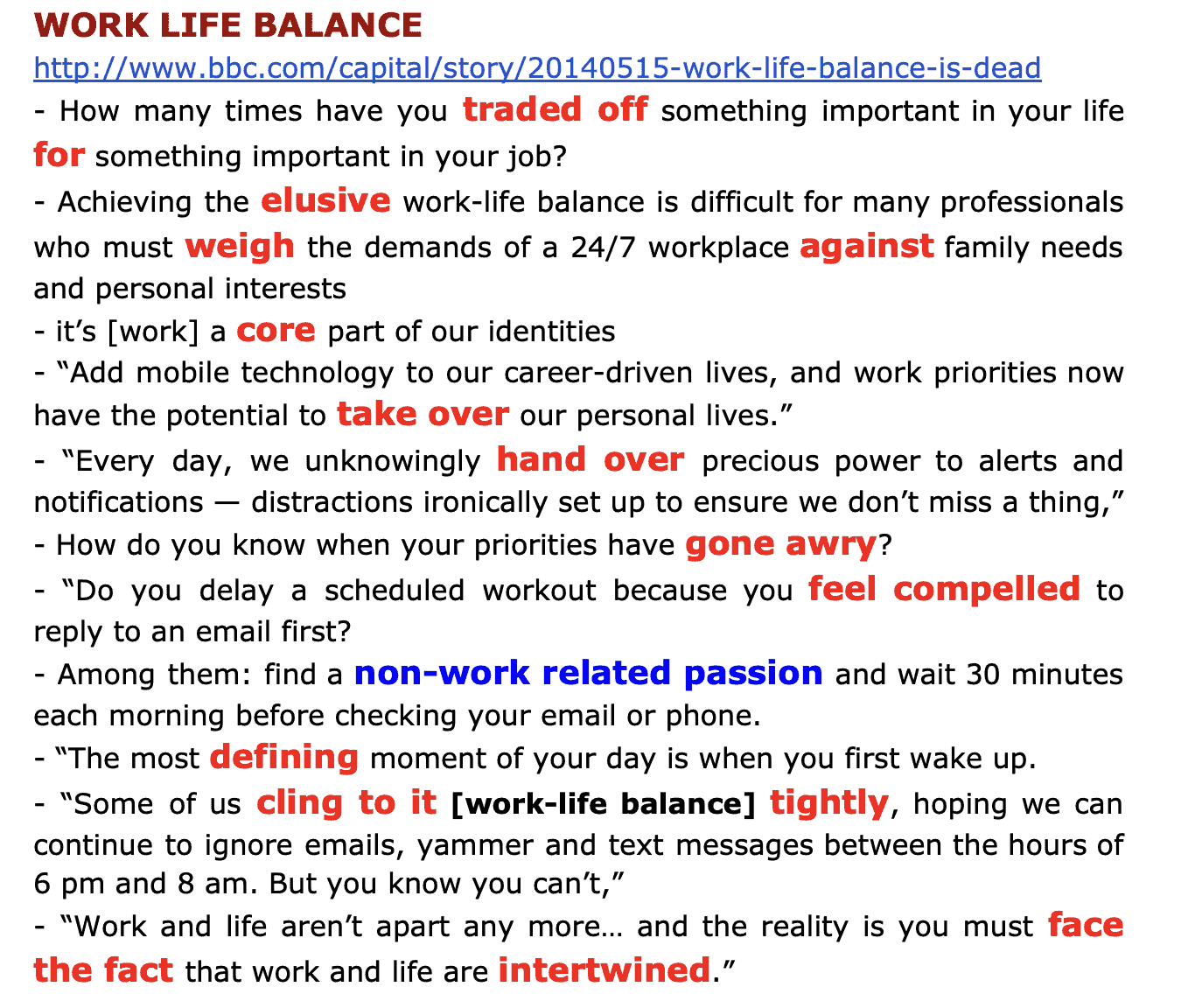
You may ask students to give either synonyms or definitions for the words and phrases in red. Non-work related passion is in blue as it's more of a structural concern rather than a lexical one. I merely explain to students the use of ‘non’ before a noun.
Here are the definitions for the selected words and phrases:
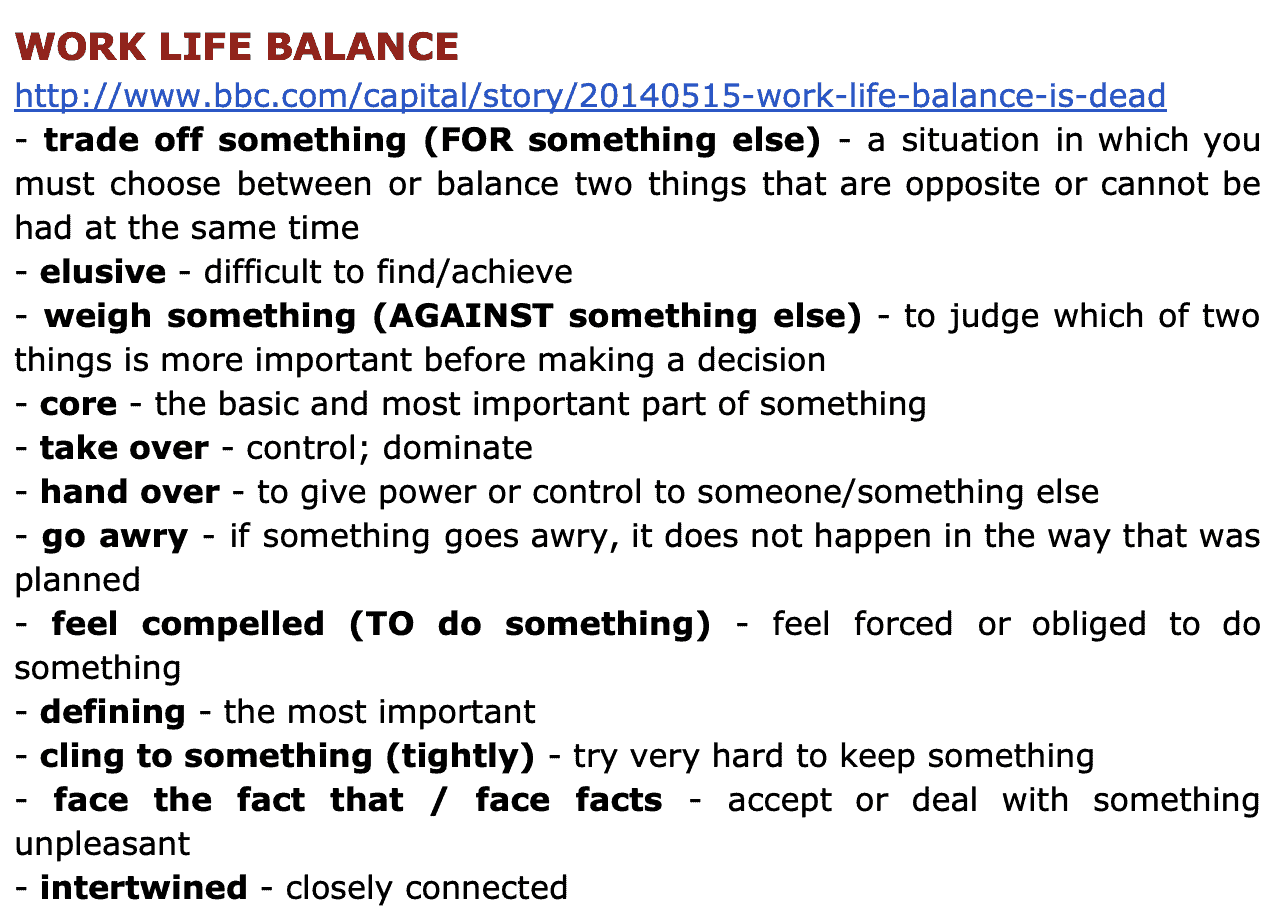
Stage 3 - Exercises based on the material at hand
An essential part of all first online English lesson ideas should be quite varied exercises based on the article or other material.
I tend to create two or three grammar-based or pronunciation exercises for each article. Here are the exercises I came up with for the BBC work-life balance article:
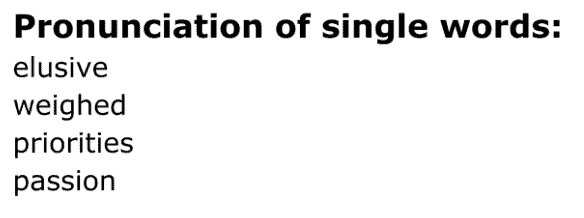
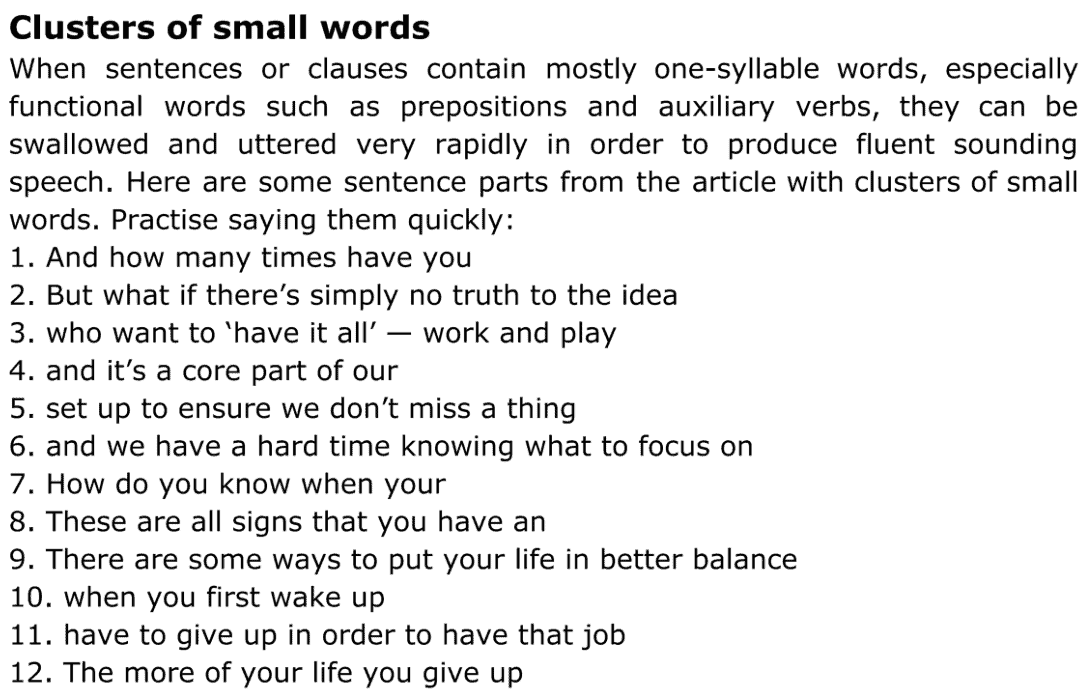
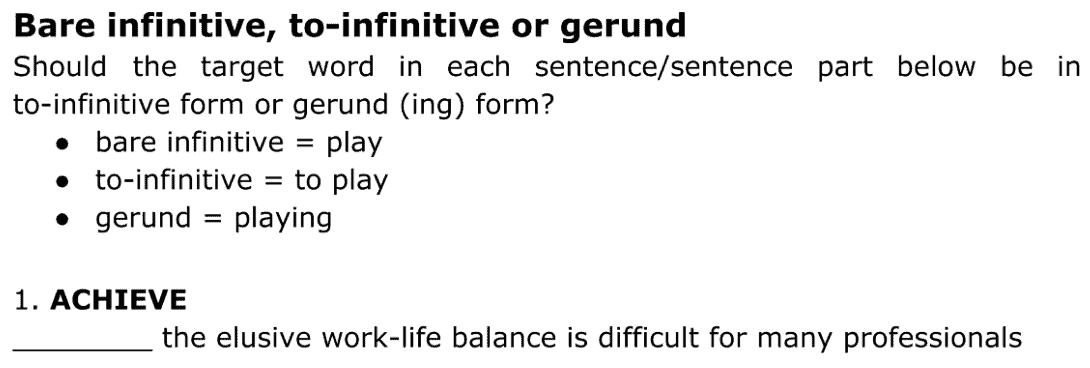
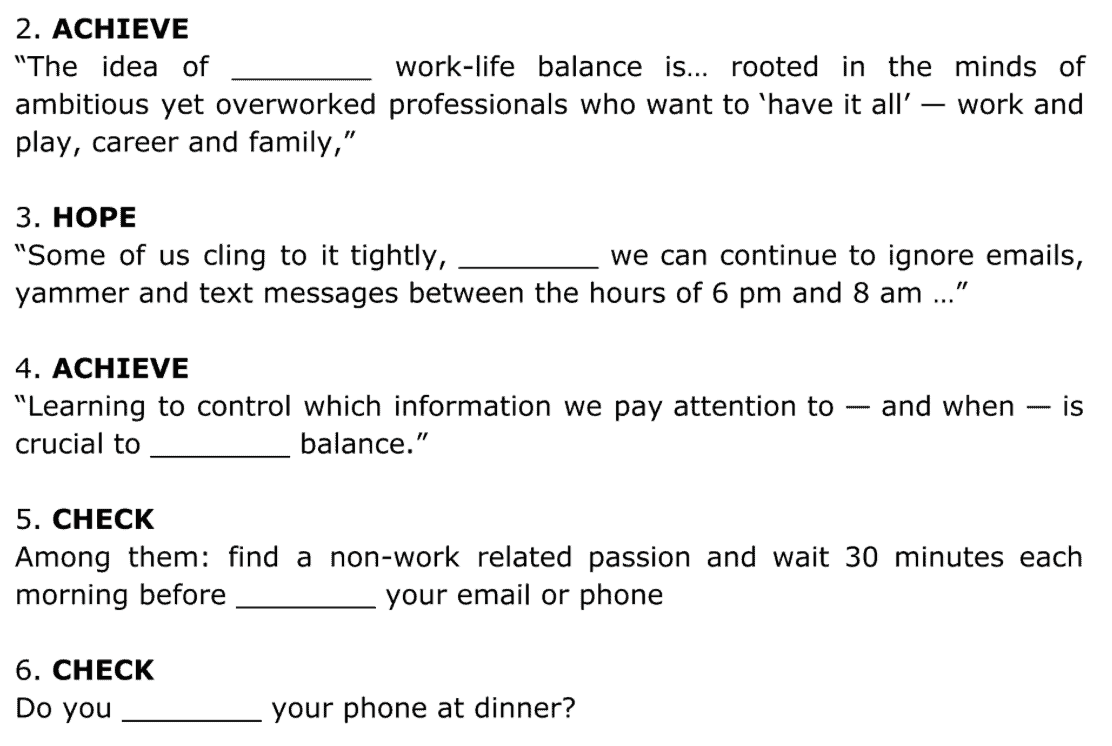
First online English lesson ideas with an emphasis on how to structure an online English language class with adult students
I have shared the first online English lesson ideas in this post in order to give you an idea about how to structure that all-important first meeting with new students. Whether it's a trial lesson or a paid session, you want to set out your stall from the get-go and show your students what you’re made of.
I’m not much of a talker in my classes with adult students. However, I do talk for a significant proportion of the first session with each new student. This is because I want to get my views across early doors about the way I think the English language should be learned. Ideally, I hope that my new students quickly adopt a language learning strategy and accept that they should focus on picking up collocations and personalising newly-learned language items rather than getting bogged down with finicky grammar items that are probably more suitable for written English anyway.



